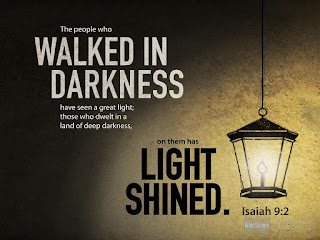Darkest Night
Read Isaiah 9:2-7.
I don't know that I've ever been in deep darkness, but I've been in some dark places. When I'm traveling and wake up in a hotel room and don't know the way to the bathroom. Or the few times I've been out camping and there are no street lights around to show the way. Or the lowest level in a cave. I've been in some dark places, but I don't know that I've ever physically been in what I would call "deep darkness" (except maybe for the cave).
Of course, Isaiah wasn't talking about a location when he wrote about "deep darkness." He was talking about a condition of the soul. No matter what the weather outside is, the state of the soul is another matter. It may or may not match what is going on outside. And I have had some times (no doubt you have, too) where it can seem very, very dark on the inside. I remember a day when my soul was occupied with many things, and it was after lunch before I really even noticed that the sun was shining outside.
The psalmist understood this kind of deep darkness. In Psalm 43, the author is going through a difficult situation. We don't know what it is, exactly, but he's begging God for vindication. "Rescue me," he writes, "from those who are deceitful and wicked" (43:1). He feels rejected by God (43:2), without light and God's faithful care (43:3). The question that rings out through the centuries, the question I have asked myself at times, comes at the end: "Why, my soul, are you downcast? Why so disturbed within me?" (43:5). And I don't know this to be a fact, but when I read this psalm, I hear another voice singing the very last line. Very often, when we are in the midst of a deep darkness, what has classically been called the "dark night of the soul," we need someone who comes alongside and reminds us of what we already know to be true: "Put your hope in God, for I will yet praise him, my Savior and my God" (43:5).
Notice the circumstances haven't changed. Those who are deceitful and wicked haven't stopped their attacks. The darkness is not any less deep. But he is reminded of God's presence in the midst of the darkness; the light that Isaiah promised is beginning to peek through just a bit. And because of that, the psalmist changes. The circumstances of life aren't different, but he is. In the midst of deep darkness, the light is beginning to dawn. And when you're in that kind of darkness, even a little bit of light makes a world of difference.
I don't know that I've ever been in deep darkness, but I've been in some dark places. When I'm traveling and wake up in a hotel room and don't know the way to the bathroom. Or the few times I've been out camping and there are no street lights around to show the way. Or the lowest level in a cave. I've been in some dark places, but I don't know that I've ever physically been in what I would call "deep darkness" (except maybe for the cave).
Of course, Isaiah wasn't talking about a location when he wrote about "deep darkness." He was talking about a condition of the soul. No matter what the weather outside is, the state of the soul is another matter. It may or may not match what is going on outside. And I have had some times (no doubt you have, too) where it can seem very, very dark on the inside. I remember a day when my soul was occupied with many things, and it was after lunch before I really even noticed that the sun was shining outside.
The psalmist understood this kind of deep darkness. In Psalm 43, the author is going through a difficult situation. We don't know what it is, exactly, but he's begging God for vindication. "Rescue me," he writes, "from those who are deceitful and wicked" (43:1). He feels rejected by God (43:2), without light and God's faithful care (43:3). The question that rings out through the centuries, the question I have asked myself at times, comes at the end: "Why, my soul, are you downcast? Why so disturbed within me?" (43:5). And I don't know this to be a fact, but when I read this psalm, I hear another voice singing the very last line. Very often, when we are in the midst of a deep darkness, what has classically been called the "dark night of the soul," we need someone who comes alongside and reminds us of what we already know to be true: "Put your hope in God, for I will yet praise him, my Savior and my God" (43:5).
Notice the circumstances haven't changed. Those who are deceitful and wicked haven't stopped their attacks. The darkness is not any less deep. But he is reminded of God's presence in the midst of the darkness; the light that Isaiah promised is beginning to peek through just a bit. And because of that, the psalmist changes. The circumstances of life aren't different, but he is. In the midst of deep darkness, the light is beginning to dawn. And when you're in that kind of darkness, even a little bit of light makes a world of difference.



Comments
Post a Comment